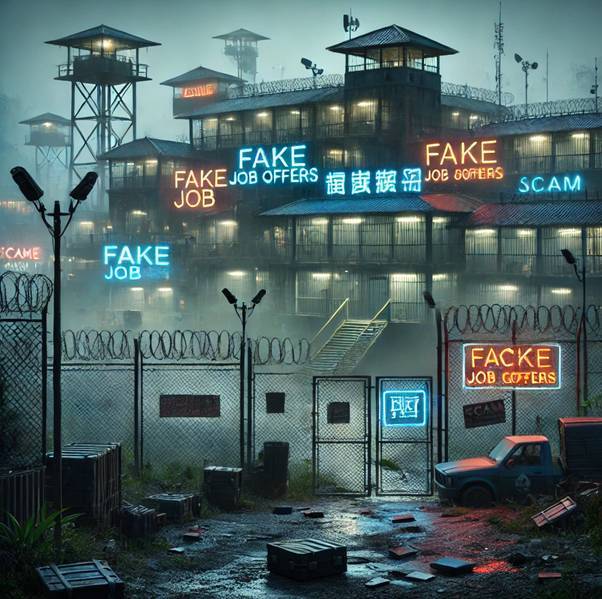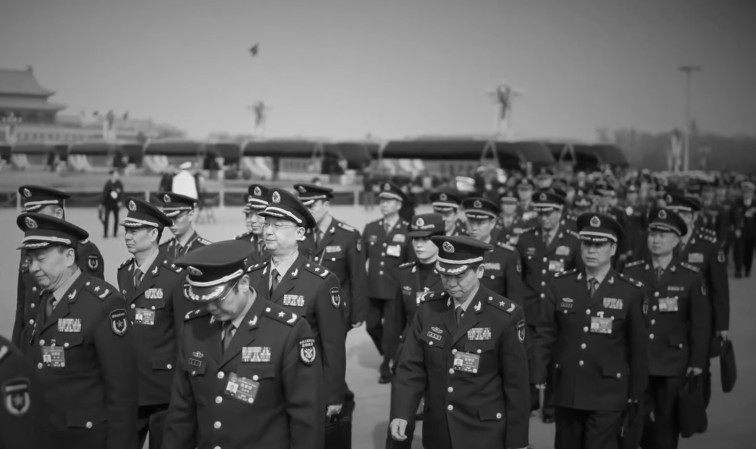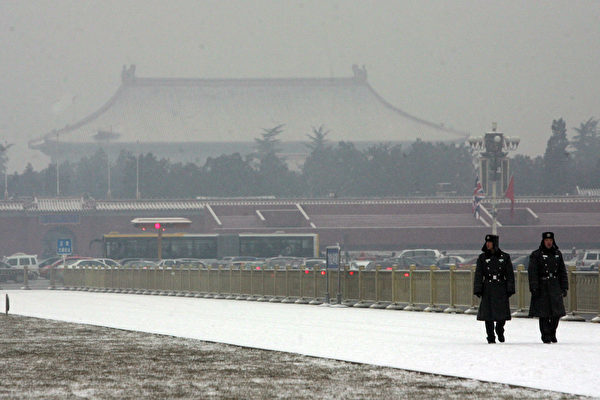An AI-generated image depicting the scam operations in Myanmar and Cambodia (AI)
[People News] Xi Jinping’s shocking remark during the 93rd military parade that he could “live to 150 years old” not only stunned the world but also stirred turbulence within the CCP. Overseas media figures, backed by internal sponsors, have been leaking information, pointing to severe infighting at the top of the regime. Analysts note that Public Security Minister Wang Xiaohong may soon be discarded by Xi, while Yihe Capital founder Wang Jizhou has revealed that the kingpins behind the Golden Triangle casinos are actually senior figures in China’s Ministry of Public Security. What’s the hidden truth?
1. Exposing the Criminal Capital of the “Golden Triangle”
The Golden Triangle lies at the junction of Myanmar, Laos, and Thailand, centred where the Ruak and Mekong rivers meet, covering roughly 200,000 square kilometres. The name “Golden Triangle” was coined in 1971 by U.S. State Department official Marshall Green at a press conference on the opium trade.
Since the 1950s, the region has been one of the world’s largest opium producers and a major hub for synthetic drug production.
It is also plagued by fraudulent operations that target not only Chinese citizens but also foreigners. On September 8, the U.S. Treasury Department’s Office of Foreign Assets Control (OFAC) sanctioned large-scale scam networks across Southeast Asia, saying they relied on forced labor and violence to swindle Americans out of billions of dollars.
The Golden Triangle was once controlled by exiled Kuomintang generals. The early proxy ruler was Khun Sa. After his downfall, power passed to four clans: Bai Suocheng, Wei Chaoren, Liu Guoxi, and Liu Zhengxiang. These families colluded with Myanmar’s military junta, running gambling, fraud, drug trafficking, and other criminal enterprises.
According to public reports, one of their agents, Naw Kham, killed many Chinese Communist Party elites who had gone gambling in Myanmar in 2001.
Wang Jizhou revealed that the CCP sent Zhao Wei, representing the Ministry of Public Security, to control northern Myanmar and set up the largest casino, “Blue Shield Entertainment.” The “Blue Shield” name itself is a symbol of the Chinese police. Behind Zhao Wei stood Liu Yuejin, Vice Minister of Public Security.
Liu Yuejin, born in January 1959, entered the ministry in 2001, promoted by Jiang faction heavyweights Meng Jianzhu and Guo Shengkun. During the 2011 “Mekong 10·5 Incident,” he led the special task force. In December 2015, he was transferred to be the ministry’s Counterterrorism Commissioner (vice-ministerial rank).
2. Foreign Media Confirm CCP Control of the Golden Triangle
In 2018, Voice of America published “What Exactly Did Zhao Wei Do to Get Sanctioned by the U.S. Treasury?” The report noted that after Zhao Wei renamed his casino “Kings Romans,” business flourished to the point of reshaping the region’s gambling industry.
The October 5, 2011, Mekong massacre severely hurt the Kings Romans casino business. Chinese state media reported that 13 Chinese sailors were shot dead by gunmen on the river near the casino.
By late 2014, an American journalist suggested those 13 were not sailors at all, but CCP elites gambling at Kings Romans. Their killing angered the four families, who allegedly retaliated by gunning down the gamblers.
In 2012, BBC Southeast Asia correspondent Jonathan Head wrote “Analysis: The Mekong Murders Raise Many Questions,” pointing out that Naw Kham had long been an untouchable warlord in the Golden Triangle. His sudden downfall reflected strong political pressure from China — “an example of a regional superpower exerting political leverage.”
On November 11, 2023, Myanmar media published an interview with “Communist spokesperson Peng Danchang,” titled “This Is a Naturally Occurring Armed Rebellion.” Peng admitted they received Chinese weapons support, explaining that Myanmar is China’s southern gateway. To prevent a repeat of Japan’s World War II invasion route through Myanmar, Beijing always keeps control of local politics. When asked, Peng said bluntly: China will never allow peace in Myanmar. Prolonged confrontation between the junta, the Burmese Communist Party, and the Kokang Army best serves Beijing’s interests.
In 2015, Kokang forces crushed the Burmese Communists, driving them even into Chinese territory. Fearing internal unrest, Beijing rushed to pay off both sides, urging them to focus on “economic development.”
Media figure Zhou Mingfeng revealed that China’s state security apparatus actually sides with the Kokang Army, whose leader is a CIA operative. He concluded this means state security has betrayed Beijing and become a U.S. proxy. Therefore, Zhou warned, if China enters a war, its internal factions will immediately collapse, and the state will disintegrate.
3. Who Really Controls the Golden Triangle?
Zhao Wei’s Kings Romans casino continues to operate today, meaning it has long since changed hands.
In 2020, Liu Yuejin left the Ministry of Public Security; on March 18, 2024, he was taken down in a corruption probe.
But Liu was only a minor player. The true controllers are his patrons — Meng Jianzhu and Guo Shengkun — in other words, the Jiang Zemin faction.
Overseas commentator Jiang Wangzheng revealed that after Wang Xiaohong became Minister of Public Security, Liu Yuejin was sidelined. Wang Xiaohong himself then lost out in a power struggle with Cai Qi’s brother-in-law, Ling Zhifeng.
Jiang reported that Ling is known for saying, “I don’t act for personal gain, I don’t engage in corruption,” which gave him a better reputation than Wang Xiaohong, who was infamous for taking bribes everywhere.
Yet in the CCP, promotions always require financial payoffs. Ling’s claim not to be corrupt suggests his wealth comes from outside mainland China. Wang Jizhou’s revelations may hint that Myanmar has already fallen under Ling’s control.
Controlling the Golden Triangle means not only controlling illicit financial resources but also commanding Myanmar’s military — indicating that Ling Zhifeng and Cai Qi’s small faction may already have the foundation to “found their own state.”
Du Wen revealed that Cai Qi once consulted a fortune-teller, who suggested renaming the “Beidaihe Meeting” to “Summer Vacation.” A female master explained: “Summer Vacation” belongs to fire, while “Beidaihe Meeting” belongs to water. Xi Jinping, born on a Dingyou day, is “Fire under the Mountain” in the traditional system, meaning his life depends on “water” to sustain his rule. She believed Cai’s renaming was an act of rebellion — a tactic to “overcome” and even kill Xi.
This fortune-teller also read from divination signs that Cai Qi had tampered with Xi’s food. As Xi’s closest aide, Cai may have already fatally endangered him.
Whether this is true remains to be seen. Analyst Zhang Tianliang concludes that the only way Xi can lose power is through health failure. Judging by his condition during the Xinjiang trip and the 93rd parade, his health is clearly failing — so Cai Qi is not the only one waiting for his downfall.
(First published by People News)











News magazine bootstrap themes!
I like this themes, fast loading and look profesional
Thank you Carlos!
You're welcome!
Please support me with give positive rating!
Yes Sure!